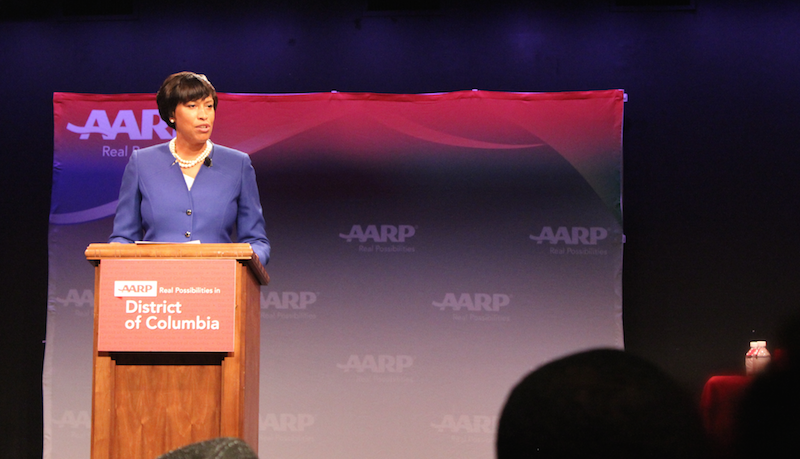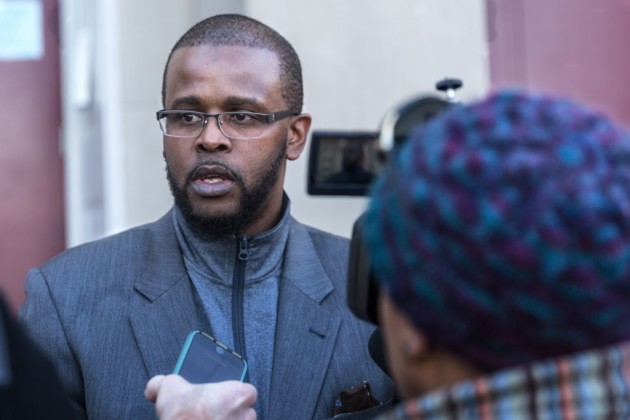Immigration Fight with Trump

Washington Mayor Muriel Bowser held an unprecedented teleconference with cityi residents to affirm the nation's capital will remain a sanctuary city. An estimated 5,000 residents called in to hear the mayor and express their concerns.
WASHINGTON — Mayor Muriel Bowser, in city-wide teleconference call Saturday, said Washington will remain a safe place for immigrants seeking asylum and city officials will continue to serve residents regardless of immigration status and religion, despite President-elect Donald Trump’s policy to end such protections.
“The incoming president said a lot of things during his campaign that most of us in the District cannot and will not ever support,” Bowser said during the call. “We will stand in opposition, strong opposition, to any policies that threaten our values, while we continue to seek common grounds on things that will be helpful for our city, like getting more jobs, more pathways to the middle class and investments in our infrastructure to prepare us for the growth that continues to come our way.”

A confrontation with protesters earlier prompted Bowser to state her positions
on immigration more adamantly during a televised conference.
City officials said the mayor’s teleconference garnered about 5,000 participants. The call came, after the mayor was met by demonstrators Nov. 15 at the Mount Pleasant Neighborhood Library in northwest Washington.
A video of the confrontation shows demonstrators telling the mayor they wanted her to hold a press conference to firmly denounce Trump’s immigration policies like those of leaders in other large U.S. cities had done.
Bowser said D.C. will remain a “sanctuary city” and said police officers will not be allowed to ask citizens their immigration status despite the risk of losing federal funding.
Sanctuary cities are considered those municipalities in the United States and Canada that have adopted a policy of protecting undocumented immigrants by not prosecuting them solely for violating federal immigration laws in the country in which they are now living illegally. legal meaning.
Since Trump’s election, mayors and police chiefs in more than 10 major cities, including San Francisco, Oakland, Los Angeles, New York, Washington and Chicago, have reaffirmed their commitment to upholding their sanctuary polices, even in the face of losing federal funding and other aid.
Bowser’s earlier statement following the election reaffirming the District’s “sanctuary city” status was considered weak by some activists.
In the call Saturday, Bowser took a stronger stance to reassure worried residents.
“We affirmed in the last days is a value that we have committed to for a number of years and that is that we are a sanctuary city,” she said. “Our police department, is not an agent of the federal government.
“What it means is that our police are focused on protecting and serving DC residents without regard to their immigration status. So, no Metropolitan Police Department officer is allowed to ask anybody what their immigration status is.”

Mayors and police chiefs in many "sanctuary cities" have said they will not
change their policies, despite threats from President-elect Donald Trump.
Residents on the call also brought up concerns on how to remain positive after the election and what should they tell their children about Trump’s win.
“I would tell them to be hopeful,” she said. “We have had transitions, uncertain transitions, in this country many times before.
“Each one of us has a responsibility to carry on with our daily lives but also stay focused on the things that we can do to protect our values in Washington, D.C.”
Some residents said they feared there will be more racial profiling within the District and whether it will be safe to attend the presidential inauguration.
Bowser said the District will continue to focus on improving police relations with residents. Police relations have steadily for more than two decades.
“Our strategy quite simply is to remind our officers in no uncertain terms what their job is and that is to protect and serve the people of the District of Columbia without regard to religion or immigration status,” she said.
Bowser said she met with the Presidential Inaugural Committee and that members of her team are working to present concrete proposals to Trump to keep the city moving in a positive direction.
She said that she will meet with the president-elect “at an appropriate time” to discuss statehood, preserving the Affordable Care Act and improving the city’s Metro system.
“I have ordered my team to review and access a broad range of challenges and strategies to protect the programs and policies that we all value and to identify concrete proposals that we can put before the new president to keep the District moving in the right direction,” she said.







